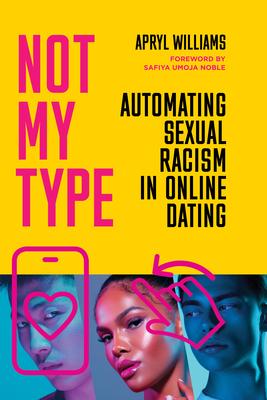In the world of online dating, race-based discrimination is not only tolerated, but encouraged as part of a pervasive belief that it is simply a neutral, personal choice about one's romantic partner. Indeed, it is so much a part of our inherited wisdom about dating and romance that it actually directs the algorithmic infrastructures of most major online dating platforms, such that they openly reproduce racist and sexist hierarchies. In Not My Type: Automating Sexual Racism in Online Dating, Apryl Williams presents a socio-technical exploration of dating platforms' algorithms, their lack of transparency, the legal and ethical discourse in these companies' community guidelines, and accounts from individual users in order to argue that sexual racism is a central feature of today's online dating culture. She discusses this reality in the context of facial recognition and sorting software as well as user experiences, drawing parallels to the long history of eugenics and banned interracial partnerships. Ultimately, Williams calls for, both a reconceptualization of the technology and policies that govern dating agencies, and also a reexamination of sociocultural beliefs about attraction, beauty, and desirability.

In the world of online dating, race-based discrimination is not only tolerated, but encouraged as part of a pervasive belief that it is simply a neutral, personal choice about one's romantic partner. Indeed, it is so much a part of our inherited wisdom about dating and romance that it actually directs the algorithmic infrastructures of most major online dating platforms, such that they openly reproduce racist and sexist hierarchies. In Not My Type: Automating Sexual Racism in Online Dating, Apryl Williams presents a socio-technical exploration of dating platforms' algorithms, their lack of transparency, the legal and ethical discourse in these companies' community guidelines, and accounts from individual users in order to argue that sexual racism is a central feature of today's online dating culture. She discusses this reality in the context of facial recognition and sorting software as well as user experiences, drawing parallels to the long history of eugenics and banned interracial partnerships. Ultimately, Williams calls for, both a reconceptualization of the technology and policies that govern dating agencies, and also a reexamination of sociocultural beliefs about attraction, beauty, and desirability.